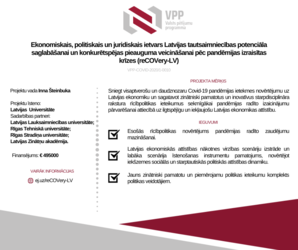Towards the Post-pandemic Recovery: Economic, Political and Legal Framework for Preservation of Latvia's Growth Potential and Increasing Competitiveness (reCOVery-LV)
Leader: prof. Inna Šteinbuka
Project partners: University of Latvia, University of Life Sciences and Technologies, Riga Technical University, Rīga Stradiņš University, Latvian Academy of Sciences
Aim: the reCOVery-LV is an academic multidisciplinary applied study that aims at developing comprehensive analysis and policy recommendations on reducing pandemic crisis economic consequences and fostering economic recovery.
The total project funding: EUR 495 000
Project implementation: 01.07.2020–31.03.2021
Project No.: VPP-COVID-2020/1-0010
Project outputs and activities
The COVID-19 crisis has been a true black swan – an unexpected event that is having enormous consequences on virtually every aspect of our daily life. Next to the 1918 flu pandemic that occurred in a very different socio-economic context, there are no historical parallels close to the current crisis, which makes forecasting and future prediction a tough task. Due to the global scale of the crisis, the collaboration and joint efforts are at the heart of solutions to the COVID-19 situation. Close cooperation is especially important in the Baltic region with highly interconnected economies and societies.
This paper aims to provide a comparative picture of the effects of the crisis and to describe the key factors and uncertainties affecting the recovery. Despite the sharp recession, there are also some opportunities arising from the situation, which are discussed in the third section of the paper. The concluding section presents possible coordinated policy actions that could support speedier recovery, long term technological progress and sustainable growth.
This review is a joint work of Foresight Centre of Parliament of Estonia, LV PEAK of the University of Latvia and Government Strategic Analysis Center (STRATA) of Lithuania. The review was finalized in October 2020.
Today, the Estonian Delegation to the Baltic Assembly (BA) participates in the digital 39th Session of the Baltic Assembly and the 26th Baltic Council, where an overview of the achievements of Estonia’s presidency is presented and the Resolution of the Session will be adopted. At the end of the session, Estonia will hand over the presidency to Lithuania, and new President of the BA will be elected.
Today, President of the Riigikogu (Parliament of Estonia) Henn Põlluaas will address the Session of the BA. In his opinion, the Baltic Sea region is one of the most successful and progressive regions in the world, but the fabric of today’s world is fragile. "The crisis will not resolve itself and we must stand firm and vigilant in the face of adversity. It is up to all of us to provide adequate joint response to tackle acute issues by building strong alliances, developing regional cooperation and nurturing trilateral and multilateral relations," Põlluaas said.
The President of the Riigikogu pointed out that the three Baltic states shared a sense of unity, knowing that together we were stronger, more flexible and, when needed, would give each other a supporting hand. "To ensure the security of the Baltic region, the Baltic defence cooperation needs to be enhanced and our NATO allies should be involved in it through a larger permanent presence. In addition to that, we must not forget that our contribution to the national, regional, and allied security starts with our individual awareness of the responsibility we have in developing and protecting democracy," Põlluaas added.
Head of the Estonian Delegation to the BA Aadu Must noted that this year the Assembly had been considerably influenced by the COVID-19 pandemic. "The unity and cooperation of the Baltic states are extremely important to us, and although meeting personally involves difficulties and restrictions, our organisations and our cooperation will persevere. We are grateful to all people who feel the same way and act in the name of bringing our countries closer to each other," Must said.
Deputy Head of the Estonian Delegation to the BA Johannes Kert emphasised that the lessons learned from the crisis had to be remembered, because those lessons and the conclusions made could be used also in other crises the Baltic states may have to face. "For example, the security situation has not calmed down, but rather we can see alarming tendencies behind our borders. However, the Baltic Assembly also deals with defence cooperation. A good example of the cooperation of the three countries is the Baltic Assembly Medal awarded yesterday to Eveli Bauer for her untiring spirit of cooperation and contribution to making the joint procurements of medicines of the Baltic states a success story," Kert said.
At the 39th Session of the BA and the sitting of the 26th Baltic Council, the report of Estonia’s presidency is presented, and the sociological and economic impact of COVID-19 on the Baltic states as well as exiting from the crisis are discussed. Also, the Joint Statement of the Baltic Council will be signed, and the BA Resolution and the Final Document of the 39th Session will be adopted. At the end of the Session, Estonia will hand over the presidency of the BA to Lithuania.
The Foresight Centre of the Riigikogu, LV PEAK of the University of Latvia and the Government Strategic Analysis Center (STRATA) of Lithuania carried out a joint study "A comparative review of socio-economic implications of the coronavirus pandemic (COVID-19) in the Baltic States". The report of the study will be presented at the BA Session.
The digital 39th Session of the Baltic Assembly, starting at 9.30 a.m., will be attended by Aadu Must and Johannes Kert, and members of the Estonian Delegation Helle-Moonika Helme, Signe Kivi, Helmen Kütt, Üllar Saaremäe, Erki Savisaar, Sven Sester and Urve Tiidus. Minister of Social Affairs Tanel Kiik and Minister of Education and Research Mailis Reps will participate in the discussion on COVID-19.
Estonia as the holder of the presidency of the Baltic Assembly organises the meetings of the Presidium, the Budget and Audit Committee, and the Consultative Council of the Baltic Assembly as videoconferences today. The impact of the coronavirus on the economies and cooperation of Estonia, Latvia and Lithuania will be discussed. The decisions of the committee meetings held during Estonia’s presidency and the priorities of the Lithuanian presidency next year will also be in the focus.
President of the Baltic Assembly (BA) and Head of the Estonian Delegation Aadu Must said that the coronavirus had brought out the bottlenecks in the so far excellent cooperation of the three countries. "For example, at the onset of the crisis, we were not able to ensure timely exchange of information or jointly coordinate the emergency measures in our region. Fortunately, we have overcome these challenges by now, but after the low contagion rate in summer, the current situation is unclear and unpredictable. Therefore, we have to learn to live together with COVID-19 and find solutions to cope with the crises caused by it," Must said.
Head of the Delegation added that Estonia had done a very good job in presiding the work of the BA under the coronavirus conditions. "We managed to make our work digital quickly and smoothly, nothing remained undone and with that, we even set an example to others," Must said.
Deputy Head of the Estonian Delegation to the BA Johannes Kert noted that the Baltic States had managed to learn a lot from the current crisis. According to him, the he most valuable lesson learned is that when countries work together, they are able to effectively contain the virus and mitigate the crisis. "Therefore, it is extremely important to continue on the same path. One of the coordination measures that could be implemented in the Baltic States is mutual assistance and coordination in the field of disaster prevention, preparedness and response," Kert said.
At present, when the security situation is becoming more tense, coordinated activities of the Baltic States in the field of security are becoming increasingly important in Kert’s opinion. "Coordinated functioning of the defence procurements system would give more security for the resources contributed. We need to continue what we have started in this important sphere," Kert added.
This spring, the Economic Affairs Committee of the Riigikogu (Parliament of Estonia) asked the Foresight Centre of the Riigikogu to analyse the economic and social implications of COVID-19. Within the framework of the research, the Foresight Centre, in cooperation with the University of Latvia think tank LV PEAK and the Government Strategic Analysis Center of Lithuania STRATA, prepared an overview of the impact of COVID-19 on economy and social sphere in the Baltic States. This document will be presented today.
Chairman of the Economic Affairs Committee and member of the Estonian delegation to the BA Sven Sester pointed out that COVID-19 had influenced not only healthcare systems and economies, but also the way the people live and work, their physical and mental welfare, and domestic situation. In his opinion, continuation of the crisis will create an excellent opportunity for the increase of public sector investments due to direct necessity, and bring about wider cooperation with the private sector. "We have already seen how rapidly and flexibly the state and businesses responded to the crisis, and by learning from these, sometimes, undoubtedly, very painful experiences, we will be able to take smarter steps in the future. Digitalisation and new business models are the keywords here," Sester said.
-
Publications
-
Latvia’s Productivity Report
-
Productivity Dialogue
-
LV PEAK Economic Barometer
- Assessment of the Effectiveness and Progress of Human Capital Development Policy in Latvia
- Implementation of the measures in the field of investment and productivity
- Creation of a quantitative assessment model of the impact of European Union funds on the Latvian economy
- Ex-post evaluation of the quality of macroeconomic and budget forecasts
- Modelling and Analysis of the Economic Impact of Climate Goals
- reCOVery-LV

 CONFERENCE
CONFERENCE
